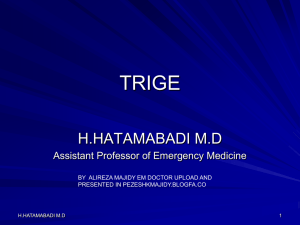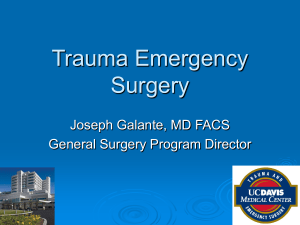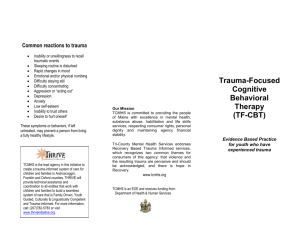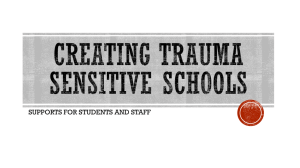Trauma Informed Practice
advertisement
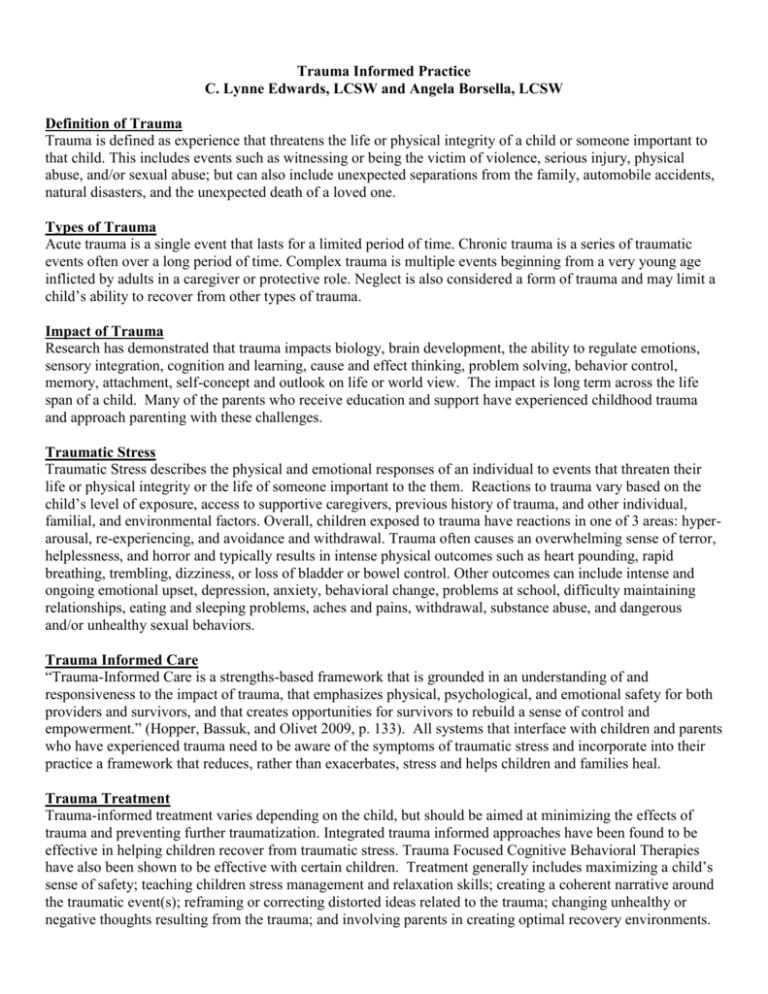
Trauma Informed Practice C. Lynne Edwards, LCSW and Angela Borsella, LCSW Definition of Trauma Trauma is defined as experience that threatens the life or physical integrity of a child or someone important to that child. This includes events such as witnessing or being the victim of violence, serious injury, physical abuse, and/or sexual abuse; but can also include unexpected separations from the family, automobile accidents, natural disasters, and the unexpected death of a loved one. Types of Trauma Acute trauma is a single event that lasts for a limited period of time. Chronic trauma is a series of traumatic events often over a long period of time. Complex trauma is multiple events beginning from a very young age inflicted by adults in a caregiver or protective role. Neglect is also considered a form of trauma and may limit a child’s ability to recover from other types of trauma. Impact of Trauma Research has demonstrated that trauma impacts biology, brain development, the ability to regulate emotions, sensory integration, cognition and learning, cause and effect thinking, problem solving, behavior control, memory, attachment, self-concept and outlook on life or world view. The impact is long term across the life span of a child. Many of the parents who receive education and support have experienced childhood trauma and approach parenting with these challenges. Traumatic Stress Traumatic Stress describes the physical and emotional responses of an individual to events that threaten their life or physical integrity or the life of someone important to the them. Reactions to trauma vary based on the child’s level of exposure, access to supportive caregivers, previous history of trauma, and other individual, familial, and environmental factors. Overall, children exposed to trauma have reactions in one of 3 areas: hyperarousal, re-experiencing, and avoidance and withdrawal. Trauma often causes an overwhelming sense of terror, helplessness, and horror and typically results in intense physical outcomes such as heart pounding, rapid breathing, trembling, dizziness, or loss of bladder or bowel control. Other outcomes can include intense and ongoing emotional upset, depression, anxiety, behavioral change, problems at school, difficulty maintaining relationships, eating and sleeping problems, aches and pains, withdrawal, substance abuse, and dangerous and/or unhealthy sexual behaviors. Trauma Informed Care “Trauma-Informed Care is a strengths-based framework that is grounded in an understanding of and responsiveness to the impact of trauma, that emphasizes physical, psychological, and emotional safety for both providers and survivors, and that creates opportunities for survivors to rebuild a sense of control and empowerment.” (Hopper, Bassuk, and Olivet 2009, p. 133). All systems that interface with children and parents who have experienced trauma need to be aware of the symptoms of traumatic stress and incorporate into their practice a framework that reduces, rather than exacerbates, stress and helps children and families heal. Trauma Treatment Trauma-informed treatment varies depending on the child, but should be aimed at minimizing the effects of trauma and preventing further traumatization. Integrated trauma informed approaches have been found to be effective in helping children recover from traumatic stress. Trauma Focused Cognitive Behavioral Therapies have also been shown to be effective with certain children. Treatment generally includes maximizing a child’s sense of safety; teaching children stress management and relaxation skills; creating a coherent narrative around the traumatic event(s); reframing or correcting distorted ideas related to the trauma; changing unhealthy or negative thoughts resulting from the trauma; and involving parents in creating optimal recovery environments.




